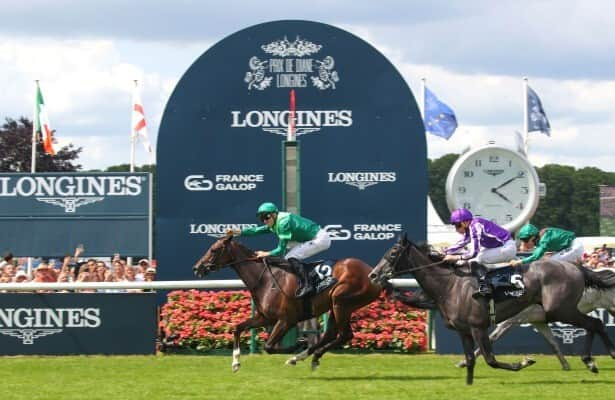Gezora wins Group 1 Prix de Diane for U.S. owner Peter Brant

Gezora, based in France but owned by American businessman Peter Brant, won the Group 1 Prix de Diane on Sunday after a superb late surge down the outside. She is trained in Chantilly by Francis-Henri Graffard, who had three runners in the race, all of whom finished among the top four.
In addition to the winner, Graffard also trained third-place Canoura and fourth-place Mandanaba. Only second-place Bedtime Story, trained by Aidan O'Brien, managed to split the trio. Such a grouped finish is a remarkable achievement for the Chantilly-based trainer, unmatched in recent memory in the Diane.
The win was fairly expected, as the filly had just claimed the Prix Saint-Alary (G2), one of the official prep races for the Prix de Diane Longines.
Gezora was ridden by Belgian-born, France-based jockey Christophe Soumillon, multiple-time winner of the Cravache d’Or, the award for France's top jockey. Soumillon secured his third win in the Diane after Latice in 2004 and Zarkava in 2008.
She is owned by American billionaire Peter Brant, who races as White Birch Farm. Brant is a major industrialist known in particular for owning the world’s finest collection of Jean-Michel Basquiat paintings. The flamboyant American has campaigned many horses in France, most notably the champion Sottsass, winner of the Prix du Jockey Club (G1) and the Prix de l’Arc de Triomphe (G1) in 2020. His best result in the Diane prior to this was a second-place finish with the brilliant Sistercharlie in 2017.
Gezora, a 3-year-old filly, was bred at Haras d’Etreham, located in Bessin, at the eastern end of Calvados, in Normandy. The stud has belonged to the Chambure family for generations and is currently run by Nicolas de Chambure. Numerous champions have been bred there, including Arc winner and blue hen mare Urban Sea, Maximova, Septieme Ciel, Anabaa Blue, King’s Best and more recently European champion Almanzor, sire of Gezora.
The last Diane winner bred at Haras d’Etreham was Montenica, back in 1947.
“Michel Zerolo spotted this filly when she was two and told me about her,” Brant said. “She’s from a beautiful Niarchos family and had good performances, so I bought her. I’ve had a lot of success with French fillies, like Sistercharlie, who might have won this race with a bit more luck. Gezora will continue her career in France.”
“Gezora won the Saint-Alary really well, and more importantly, she continued to progress after that victory, so she came into the big day in peak condition,” Graffard said. “I didn’t really know her limits, so it’s no surprise to see her win. She’s an easy, professional filly. With this win, she gets a wild card for the Arc: we’re keeping all options open, especially since we know she loves soft ground. It’s incredibly emotional, especially with my father here today—he’s always supported me, even though he’s not from the racing world at all...he dreamed I would become a Formula 1 driver.”

